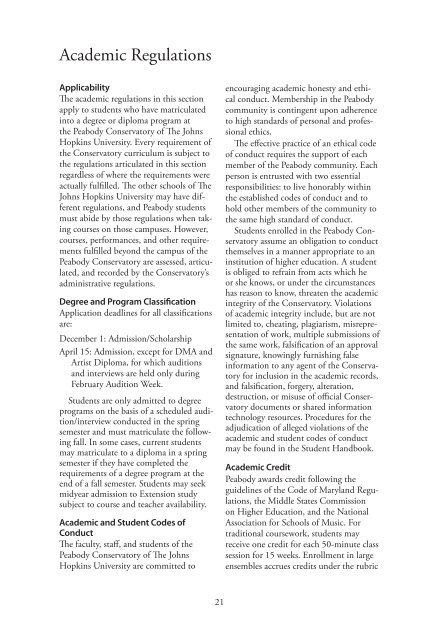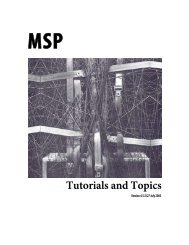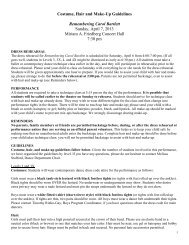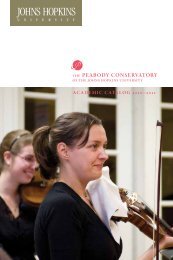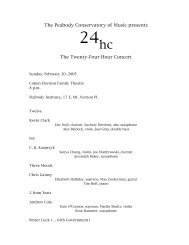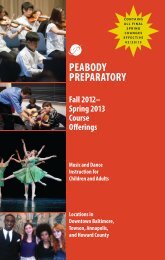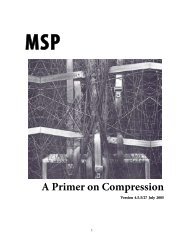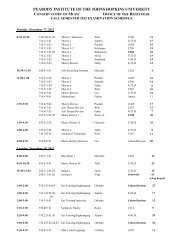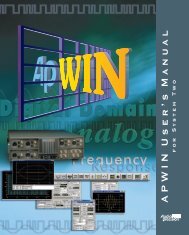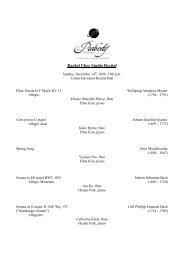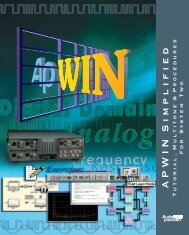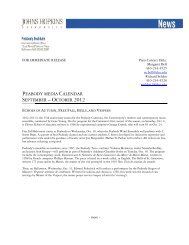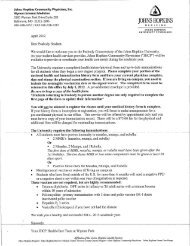Academic Information - Peabody Institute - Johns Hopkins University
Academic Information - Peabody Institute - Johns Hopkins University
Academic Information - Peabody Institute - Johns Hopkins University
Create successful ePaper yourself
Turn your PDF publications into a flip-book with our unique Google optimized e-Paper software.
for laboratory courses reflecting especiallyNASM’s observation that ensemble creditscan reflect the amount of expected studentpreparation or a relationship to othercredit requirements. <strong>Peabody</strong> grants twocredits for success in large ensembles andhas done so since 1985.Finally, while accredited music schoolsmay award as many as six credits for asemester of major lessons, they shouldonly do so if the lessons include the equivalentof a final exam. <strong>Peabody</strong> awards fourcredits for major lessons and one to twocredits for the exam: the jury or recital.The disaggregation of credits for the lessonsand the jury/recital is integral to<strong>Peabody</strong>’s assessment of student learning,as noted below.Sources of CreditStudents must complete most of therequirements for a degree or diplomathrough credits earned for courses taken at<strong>Peabody</strong> as a matriculated student. However,students may transfer some creditstaken at accredited post-secondary schoolsor through the accelerated testing of recognizedproviders (such as the CollegeBoard or International Baccalaureate).PerformanceLike most conservatories, <strong>Peabody</strong> doesnot accept transfer credits for lessons,juries, or recitals. For transfer students,the year of study (sophomore or junior)is determined by the department at thetime of the audition and validated by theyear-end departmental jury. <strong>Peabody</strong> doesnot accept transfer credits for ensembles.Performance majors must participate inensembles in every semester of instruction,and transfer students must participatein ensembles for at least two years.Distance LearningIt is a policy of The <strong>Johns</strong> <strong>Hopkins</strong> <strong>University</strong>that students may not take onlinecourses from another institution whiletaking classes during the regular fall orspring semesters. Over intersession andthe summer, students may take onlinecourses provided the courses are offered byan accredited institution.Transfer CreditsAll other transfer credits are acceptedpending the submission of the necessarydocumentation to the Office of the Registrarand at the discretion of departmentchairs in consultation with the AssociateDean for <strong>Academic</strong> Affairs. <strong>Peabody</strong> canonly transfer credits for students whohave already matriculated into degree ordiploma programs. New students are welcometo contact the Office of <strong>Academic</strong>Affairs before enrolling but will not beable to begin the process of transferringcredits until after enrolling in classes.Undergraduate StudentsAccelerated CreditFor undergraduate students, acceleratedwork in high school is only accepted onthe basis of an examination that is documentedwith scores mailed directly to theOffice of the Registrar. Superior scores ofeither a 4 or a 5 on the Advanced PlacementExaminations or a 50 on the CLEP,administered by the College Board, or a6 or 7 on the International BaccalaureateExam may be accepted. Credits forcourses taken at another accredited collegeor university may be accepted onlyon receipt of a transcript demonstrating agrade of C or better. The requirements foreach area of study are detailed as follows:Music TheoryThe Department of Music Theory doesnot accept transfer credits at the undergraduatelevel. Advanced placement inmusic theory is possible only on the basisof the Advanced Placement UndergraduateExam in Music Theory (AP-UGrad)offered during Orientation Week, whichincludes part-writing, analysis, and counterpoint.Samples of this examination are22
available from the Admissions Office or atwww.peabody.jhu.edu/theory.Music HistoryThe Musicology Department considerstransfer credits on a case-by-case basis.Undergraduates may not apply morethan two courses from other institutionstoward their <strong>Peabody</strong> undergraduatedegrees, and they must receive at least aB in any courses transferred. AdvancedPlacement courses in musicology or musichistory cannot be counted toward theundergraduate musicology curriculum.HumanitiesIncoming <strong>Peabody</strong> students may petitionthe Humanities Department and theOffice of <strong>Academic</strong> Affairs to substituteCore courses with appropriate courseworkat Homewood or elsewhere. Up tonine credits of AP, IB, or CLEP may beaccepted to fulfill Humanities electiverequirements.Transfer students may petition tofulfill Humanities Core course requirementson the basis of appropriate transfercredits (accepted for coursework earninga “C” or better). Students are advised toconsult with the chair of Humanities forthe articulation of external credits to theHumanities core.Because the state of Maryland requiresspecific coursework for teacher certification,the Music Education departmentdirectly oversees the Humanities curriculumfor students in the Music Educationprogram. Music Education studentsshould contact the chair of MusicEducation about transferring AP or IBcredits and consult with the chair beforeenrolling in general studies courses atother institutions.General ElectivesAdditional AP, IB, or CLEP credits as wellas credits taken at other accredited collegesmay be transferred as general electives,pending approval of the Associate Deanfor <strong>Academic</strong> Affairs.Graduate StudentsA maximum of six credits of graduatestudy completed at other accreditedinstitutions may be applied to degree ordiploma programs at <strong>Peabody</strong>, with thereview and approval of department chairsand the Associate Dean of <strong>Academic</strong>Affairs. Only credits that have not beenearned in fulfillment of a previous degreemay be transferred. All credits transferredto a graduate degree or diploma programmust have been earned within five yearsprior to the student’s first graduate degreeregistration at <strong>Peabody</strong>.Continuing Graduate Students<strong>Peabody</strong> alumni continuing to subsequentprograms of study may transfer no morethan six credits of work completed at<strong>Peabody</strong> with the permission of theirmajor teachers and the oversight of theAssociate Dean for <strong>Academic</strong> Affairs.Only credits that have not been earned infulfillment of a previous degree may betransferred between programs. In somecases, the Associate Dean may refer suchtransfers to the Graduate Committee orthe DMA Committee.Grading System and RegulationsLetter grades are given for private lessons,coursework, ensembles, juries, and recitals.For the purposes of assessing academicprogress, letter grades are assigned gradepoints as follows:A 4.00A– 3.67B+ 3.33B 3.00B– 2.67C+ 2.33C 2.00C– 1.67D 1.00F 0.0023
No grade points are assigned for the followingnon-credit designations:AUIIPWAuditIncompleteIn ProgressWithdrawnIncomplete and Withdrawn are permanentgrades. For each of these grades, thestudent receives no credit. The grade of InProgress is temporary and will resolve toa permanent grade before the end of thenext regular semester.Grade point averages (GPA) are computedeach semester and reported as termand cumulative GPA. A GPA is determinedby multiplying the grade points foreach earned grade by the number of creditsfor the course; the product is called thenumber of quality points. For example,a B– in a three-credit course earns 8.01quality points (2.67 x 3 credits). A GPA isthe total number of quality points dividedby the total number of attempted credits.Some classes are not assigned lettergrades and are therefore not calculatedin a GPA. Such classes include ArtistDiploma recitals, portfolios, dissertations,graduate review courses, remedial undergraduatecourses, and English as a SecondLanguage courses. These classes are gradedas follows:PFPassingFailingNCR No credit (Note that other institutionsmay use NGR for “No GradeReported.”)Incomplete GradesA grade of IP (In Progress) may be givenif a student whose work has been satisfactoryis not able to complete the courserequirements by the end of the semester.Grades of IP must be requested beforethe end of the semester by the studentand approved by the appropriate facultymember.The grade of IP for a jury or graduatehearing is granted only for reasons of illnessor injury. Students requesting thegrade of IP for a jury or graduate hearingmust provide appropriate medicaldocumentation to the Office of <strong>Academic</strong>Affairs.A grade of IP that is not satisfied by thestudent within the first four weeks of thesucceeding semester will automatically bechanged to F on the student’s permanentrecord. Students receiving an IP in anycourse are not eligible for the Dean’s Listfor that semester.Grade AppealsStudents are welcome to make respectfulinquires about the calculation of theirgrade. If a student disputes a recordedgrade, he or she can appeal the gradethrough direct communication withthe instructor. If the matter cannot beresolved with the instructor, the studentmay take his or her appeal to the chair ofthe department. If the matter cannot beresolved with the chair, the student maytake his or her appeal to the AssociateDean for <strong>Academic</strong> Affairs for a final decision.Neither the chair nor the AssociateDean will consider a student appeal untilthe student has attempted to resolve thematter with the instructor.Grade ChangesGrades are only changed at the request ofthe course instructor in order to resolvean IP grade or to correct an error ingrading. The instructor should requesta change of grade by contacting theConservatory Registrar, who will conferwith the Associate Dean for <strong>Academic</strong>Affairs. Changes of grade should berequested and addressed promptly. Absentextraordinary circumstances—whichwould require broader consultation withthe Conservatory leadership—no gradewill be changed after 18 months of beingposted to the student’s record.24
Satisfactory <strong>Academic</strong> ProgressSatisfactory <strong>Academic</strong> Progress as aMeasure of Good <strong>Academic</strong> StandingConservatory students who have matriculatedin curricular programs are requiredto make measured progress toward theirdegree or diploma every semester andmaintain Good <strong>Academic</strong> Standing,which is an institutional definition ofaccomplishment for a period of study.Students who receive federal financial aidare also required to maintain Satisfactory<strong>Academic</strong> Progress (SAP), which is theinstitution’s legal obligation to declareand enforce standards codified in federalregulations.At the <strong>Peabody</strong> Conservatory, Good<strong>Academic</strong> Standing and Satisfactory <strong>Academic</strong>Progress are combined into oneset of standards that apply to all studentsof the Conservatory, regardless of theirsources for tuition funding. As a result,the measure of student progress is consonantwith federal regulations. In whatfollows, we use the expression Satisfactory<strong>Academic</strong> Progress both in the restrictivesense required by law and in the moreencompassing sense of the Conservatory’sinstitutional prerogative to remedy orremove students who cannot meet thebenchmarks of Good <strong>Academic</strong> Standing.Oversight and Compliance ofSatisfactory <strong>Academic</strong> ProgressReflecting the nature of the Conservatory’scurricula, the Office of <strong>Academic</strong> Affairs,in consultation with the ConservatoryFaculty Assembly, is tasked with upholdingthe standards of Satisfactory <strong>Academic</strong>Progress. Students who receive FederalStudent Financial Aid must maintain Satisfactory<strong>Academic</strong> Progress (SAP) towardobtaining their degree or certificate. Monitoringcompliance is a joint venture ofthe Office of <strong>Academic</strong> Affairs, reflectingthe decision making of the faculty, andthe Financial Aid Office. <strong>Academic</strong> Affairsreports the progress of every student;Financial Aid disaggregates the studentswho receive Federal Student Financial Aidand reports that information to regulatorsas required by law.The Measurements for Satisfactory<strong>Academic</strong> Progress<strong>Peabody</strong> evaluates student success with thethree measures required by law. Each class,lesson, ensemble, jury or recital resultsin a grade that figures into a GPA. Theevaluation of a student’s GPA is a qualitativeassessment of progress. Students mustmeet the minimum GPA threshold everysemester as noted below. Given the curricularemphasis on the major area, studentsmust earn higher grades in lessons andperformances.Satisfactory <strong>Academic</strong> Progress alsorequires students to complete their degreeprograms with expedience. Therefore,in addition to maintaining the full-timecredit load, students must complete acumulative threshold sum of credits eachacademic year. Students must earn at leasttwo-thirds of all credits attempted towardtheir program. The benchmarks of thesequantitative assessments are scaled to individualprograms as noted below and willensure completion of a degree or diplomaprogram within the stipulated maximumtimeframe, which is 150 percent of theprogram length.Undergraduate Benchmarks forSatisfactory <strong>Academic</strong> ProgressTo maintain Satisfactory <strong>Academic</strong>Progress, undergraduate students must: grade point average of at least 2.00 area enrollments (lessons, juries,recitals, hearings) year.25
ate of two-thirds of credits attemptedtoward the program.Graduate Benchmarks forSatisfactory <strong>Academic</strong> ProgressTo maintain Satisfactory <strong>Academic</strong> Progress,graduate students must: grade point average of at least 3.00 area enrollments (lessons, juries, recitals,hearings) each year as follows: Master of Musicand Doctor of Musical Arts studentsmust satisfactorily complete 18 credithours per academic year; GraduatePerformance Diploma students mustsatisfactorily complete 8 credits peracademic year Artist Diploma studentsmust complete 8 credits and performtwo degree recitals per academic year. rate of two-thirds of credits attemptedtoward the program.Treatment of W, I, IP, AU, F, S, andP Grades, No Grade Reported andRepeated Coursework1. Course withdrawals (W) are notincluded in the GPA calculation andare considered a non-completion ofattempted coursework.2. Incomplete courses (I) and In-Progresscourses (IP) are not included in theGPA calculation and are considered anon-completion of attempted courseworkuntil the coursework is completedand graded with a permanent grade.3. Audited courses (AU) and other noncreditcoursework are not consideredattempted coursework or includedwithin the GPA calculation, nor isthe coursework considered for federalfinancial aid eligibility.4. A satisfactory (S) grade or a passing (P)grade are treated as attempted creditsthat are earned but are not included incalculation of GPA.5. Failing (F) grades are treated asattempted credits that were not earnedand are included both in the calculationof GPA and minimum completionrate.6. If no grade is reported, the courseworkis not included in the GPA calculationand is considered a non-completion ofattempted coursework until the courseworkis completed and graded with apermanent grade.7. The highest grade earned in a coursethat is repeated will count in the GPAcomputation, but every repeatedattempt will be included in the completionrate determinations.Transfer Credits and SAPCredits accepted for transfer to the student’sprogram of study by the Conservatoryare included in the quantitativemeasurement component of Satisfactory<strong>Academic</strong> Progress as both attempted andearned credits. Grades earned at otherinstitutions are not, however, countedwhen computing the student’s GPA.Remedial Courseworkand Advanced PlacementRemedial coursework and ESL courseworkare not included in the determinationof the student’s completion rate.However, remedial coursework may counttoward the determination of full-timestatus as required for maintenance of anF-1 visa.Monitoring and Reporting<strong>Academic</strong> ProgressThe Conservatory Registrar and the AssociateDean for <strong>Academic</strong> Affairs reviewall transcripts every semester and identifystudents who are not meeting the benchmarksfor Satisfactory <strong>Academic</strong> Progress.26
The Associate Dean, in consultationwith a standing committee of the FacultyAssembly, will then select an appropriatecorrective action for students to improvetheir academic standing. Students who donot meet the minimum benchmarks willbe placed on warning for dismissal andwill be informed accordingly before thestart of the subsequent semester.It is the preference of the Conservatoryto inform students by letter mailedto their permanent address as designedby FAFSA in the ISIS registration system.Because of the comparatively short breakbetween the fall and spring semesters andgiven the high percentage of internationalstudents, many notifications betweenthe fall and spring semester will be madeby email with a hard copy sent to thestudent’s campus mailbox. In each case,every notification concerning a student’sacademic progress will be copied to thestudent’s major teacher, who is rightlyidentified as an academic advisor in ISIS.A student who has been warned for dismissalis still eligible for financial aid forone semester until <strong>Academic</strong> Affairs canre-evaluate the student’s academic progressat the conclusion of the subsequent regularsemester (i.e., the “warning” semester).If a student fails to meet the benchmarkat the end of the warning semester, thestudent will be dismissed.AppealsConservatory students contend with thesame difficulties faced by other collegestudents, but the Conservatory’s curriculademand a much higher credit loadthan curricula for other degree programs.The extensive academic requirementscoupled with musical performance and ashorter cycle for formative assessments—aweekly private lesson and a yearly jury orrecital—may create a situation that hindersthe academic performance of somestudents. Moreover, like athletic programs,the physicality of extensive performingcan cause injuries that work against astudent’s success both in the Conservatoryand beyond.If a student fails to meet the benchmarksfor Standard <strong>Academic</strong> Progressbecause of health issues, personal difficulties,or the competing demands ofemployment or family responsibilities, thestudent may submit an appeal and supportingdocumentation to the AssociateDean for <strong>Academic</strong> Affairs in pursuit ofa waiver or other provisional mitigationsuch as an informal letter of concern.To be considered for a waiver or mitigationbecause of health issues, the studentmust provide documentation from aprofessional provider with licensure inthe United States. For matters unrelatedto health, the student must submit a letterindicating: 1) the nature of his or herpersonal difficulties; 2) the length of theperiod of time the difficulties have affectedthe student’s performance; 3) the stepstaken to resolve the difficulties; and 4) aplan for resolving all difficulties before theend of the subsequent semester.Appeals must include: working too many hours, medicalissues, etc.) standsthe reason behind his or herfailure to meet the SAP requirements current academic statusThe appropriate standing committeewill review the appeal and consult withfaculty as appropriate. If it is determinedthat the student will not be able to meetthe minimum standards by the end ofthe next semester but the committee is inagreement that the student’s grounds forappeal are reasonable and the student hasa reasonable chance to succeed and graduate,the committee may choose to create acustomized academic plan for the student.27
Students will receive written notificationof the decision. All decisions on appealsare final.When an appeal is approved, thestudent is placed on “probation” for thefollowing semester. Some students whoseappeal is approved will be placed on anacademic plan. The purpose of an academicplan is to support the student inbringing himself or herself back into compliancewith the minimum benchmarksfor Satisfactory <strong>Academic</strong> Progress by aspecific point in time in order to ensurethat the student will be able to successfullycomplete the program and graduate.The academic plan will be specificallytailored to the student and may includemilestones and specific requirements suchas a reduced course load, specific courses,or tutoring.Re-evaluationStudents who have been placed on warningfor dismissal are tracked with particularscrutiny, and the Office of <strong>Academic</strong>Affairs contacts all faculty members teachingthese students by the middle of thesubsequent regular semester. When gradesare reported, the Associate Dean, in consultationwith the relevant faculty committee,will either 1) remove the warningfor dismissal if the student meets theminimum standards, 2) place the studenton “probation” for the following semester(if the student successfully appealed dismissal),or 3) dismiss the student from theConservatory.Outside Sources of Financial AidMaintenance of Good <strong>Academic</strong> Standingand Satisfactory <strong>Academic</strong> Progress arerequirements for continued eligibility forfinancial assistance from federal and statesources.Definition of Full-Time Status and Credit LimitsProgram of StudyMinimum creditsfor full-time statuseach semesterMaximum credits(excluding lessons,ensembles and recitals)each semesterBachelor of Music (BM) 12 UnlimitedPerformer’s Certificate (PC) 12 UnlimitedMaster of Music (MM) 9 + 9*Doctor of Musical Arts (DMA) 9 + 9*Graduate Performance Diploma (GPD) 4 +4**Artist Diploma (AD) 4 +4*** MM and DMA students may take only a combined six credits from the departments ofMusic Theory and Musicology in each semester. Music Theory courses begin with theprefix 710; Musicology courses begin with the prefix 610. Remedial work is excludedfrom this total.** AD and GPD students must be enrolled as full-time students.Conservatory tuition includes majorperformance requirements and academiccredits. For most programs, a student willtake major lessons (4 credits), an ensemble(2 credits), and a recital (2 credits).Students who give degree recitals mustbe enrolled in lessons. Most performancemajors enrolled in lessons must be enrolledin an ensemble. See individual curricularlistings for specific requirements.28
Undergraduate students enrolled in BMdegree programs or the Performer’s Certificatediploma program may register foras many credits as is appropriate for theirplan of study. Undergraduates must enrollin a minimum of 12 credits each semesterto maintain full-time status and complete30 credits each year to demonstrate Satisfactory<strong>Academic</strong> Progress.Students enrolled in the Music Educationdegree will be classified as full-timestudents with a course load of seven creditsduring the semester in which they par-fulfillment of their degree requirements.Graduate students enrolled in the MMor the DMA degree programs must enrollin a minimum of nine credits each semesterto maintain full-time status and complete18 credits each year to demonstrateSatisfactory <strong>Academic</strong> Progress. MM andDMA students may enroll in lessons,ensembles, recitals, and a maximum ofnine academic credits each semester. Ofthose nine credits, only six credits canbe in the departments of Music Theoryand Musicology. Undergraduate languageclasses, pedagogy classes, departmentalclasses, remedial coursework, and anyelective coursework not offered as MusicTheory or Musicology will be excludedfrom this academic credit limit. Any combinationof Music Theory and Musicologycredits in excess of six hours or any combinationof academic courses in excess ofnine credits will entail per-credit chargesadded to the cost of yearly tuition.Graduate students enrolled in theGPD or AD diploma programs must beenrolled in lessons and must complete aminimum of eight credits each year tomaintain full-time status. In addition tolessons, unlimited ensembles, and recitals,students in the GPD and AD programsare allowed to enroll in a maximum offour academic credits each semester. <strong>Academic</strong>credits in excess of four will entailadditional per-credit hour fees.The credit limits for graduate degreesreflect <strong>Peabody</strong>’s educational philosophythat graduate students should attend tothe intense challenges specific to theirmajor area and related academic studies.Dean’s List CriteriaThe criteria for inclusion on the Dean’sList are:1. Full-time status in an undergraduatedegree program2. A semester grade point average of 3.67or higher3. No Incomplete grades for the semesterStudents who achieve the Dean’s Listwith a semester grade point average of3.90 or higher will be designated “HighHonors.”Graduation EligibilityThe <strong>Peabody</strong> Conservatory awardsdegrees and diplomas once each yearat a commencement ceremony in May.Students may complete the requirementsfor a program in the fall semester andhave their registration status changed to“requirements completed.” However theymay not be said to have graduated fromthe Conservatory until after the Maycommencement.Students must petition to graduate fromthe <strong>Peabody</strong> Conservatory by completinga form provided by the Office of theRegistrar. The petition clarifies the student’sname for the diploma and reservesor releases space at the commencementceremony. The petition also initiates severalimportant processes, including a finalaudit of credits, a clarification of contactinformation, and a review of the student’saccount. While students are encouraged tosubmit this petition in the fall semester ofthe year in which they intend to graduate,they must submit the petition to the Registrar’sOffice by no later than January 31 ofthat year.29
To be approved for graduation, studentsmust resolve any and all outstandingcharges of misconduct and violations ofacademic ethics, in addition to satisfyingall degree requirements and settling allfinancial obligations.Attendance and AbsencesClasses and LessonsRegular attendance in classes and lessonsis expected of all students. A statementof individual class attendance policy isprovided in each class at the beginning ofeach semester. It is expected that any illnessresulting in an absence will be appropriatelydocumented.All students who are absent from classfor an extended period of time, or for apersonal or medical emergency, shouldcontact the Office of <strong>Academic</strong> Affairswith appropriate documentation andask that their teachers be notified. Thesenotifications do not signify approval butare sent to instructors as a courtesy. Thestudent remains responsible for makingup all missed work and for securing thepermission of the instructors for absences.AuditingFull-time students may audit any Conservatoryclass with permission of theinstructor. Part-time students must paythe regular cost for each course of study,unless otherwise specified.Course Changes and WithdrawalsThe Registrar’s Office must approve allcourse additions, withdrawals, or changes.Courses or lessons dropped within the firstfour weeks of a semester will be deletedfrom the student’s registration. Withdrawalsdo not become effective until theproperly signed forms are received in theRegistrar’s Office. Courses dropped afterthe fourth week of the semester will berecorded with an automatic grade of W.The deadline for changing sections orwithdrawing from classes is the end of the10th week of the semester. Exact deadlinedates are listed in the <strong>Academic</strong> Calendar.Courses may not be changed fromCredit to Audit after the sixth week of thesemester.Change of MajorStudents requesting a change of majormust qualify through auditions and interviewswith appropriate faculty. To initiatea change of major, a student must completea Change of Major form available inthe Admissions Office.Interruption of Degree WorkA leave of absence is an approved interruptionof a degree program that is subjectto a fixed duration and/or specific requirementsfor return. A withdrawal is a completedeparture from the Conservatoryand its degree programs. A withdrawalcan only be reversed through the mechanismsof re-audition and petition of therelevant academic committee. Studentswho do not return from a leave of absenceafter two semesters or contact the Officeof <strong>Academic</strong> Affairs for an extension of athird semester will be automatically withdrawnfrom the Conservatory.Leave of AbsenceA student may request a leave of absenceby contacting the Associate Dean for <strong>Academic</strong>Affairs. The <strong>Peabody</strong> Conservatory isnot obliged to grant a leave of absence. Studentsshould present compelling personalor professional reasons for the interruptionof studies when requesting a leave ofabsence. A leave of absence is not grantedretroactively. Students must request theleave of absence before postponing theirstudies. Moreover, a leave of absence is subjectto the following conditions: dentwho has matriculated into theConservatory. coursework to fulfill the requirementsof a degree program.30
their coursework are no longer eligiblefor a leave of absence. jeopardy for dismissal on academicgrounds. arrangements regarding his or her visawith the International Student Advisor. must make the appropriate arrangementswith the Financial Aid office. for all financial obligations, includingbut not limited to tuition, instrumentloans, library fines, and residence fees.If a leave of absence has been granted,the leave will be made for a fixed durationof one semester or one year. During thattime, a student may not be enrolled as afull-time student at another institution.Any credits earned at another institutionduring the leave of absence must beapproved for transfer by the AssociateDean for <strong>Academic</strong> Affairs in consultationwith department chairs.A student on a leave of absence mustnotify the Office of <strong>Academic</strong> Affairs inwriting of the intent to return by November15 for re-enrollment the followingspring semester, or by April 15 for fallre-enrollment. A tuition deposit of $50 isrequired at that time to reserve space onthe major teacher’s roster; however, a studentrequesting a leave of absence is notguaranteed a space in a teacher’s studioupon return to school.Medical Leave of AbsenceIn certain circumstances, a student with achronic condition that is documented bylicensed caregiver will be placed on a medicalor involuntary leave of absence by theAssociate Dean for Student Affairs. A studentwill be administratively withdrawnfrom all classes and receive no credit. Thisstep will be taken when necessary to protectthe safety of the student or other individualsor to preserve the integrity of theuniversity’s learning environment. Such adecision may be based on behavior and/orcommunication that: or safety of the student or others damage to the property or resources ofthe university or alcohol abuse of the university community ingincompatible with successful participationin the academic programIf a medical or involuntary leave ofabsence is required, the leave may notexceed one year without the studentrequesting an extension and providingthe appropriate documentation from alicensed professional. A student wishing toreturn must notify the Office of StudentAffairs in writing of the intent to return.An assessment of the student’s fitness forreturn will be required as a condition ofreturning from a medical or involuntaryleave of absence and study at the Conservatorymay only resume at the scheduledstart of a semester.Extended LeaveAny student on a leave of absence mustreport his or her status to the Conservatoryby the middle of the second semesterof leave in order to make arrangements toreturn or to extend the leave of absencefor an additional one semester. Studentswho are granted an extension to a leaveof absence beyond the originally stipulatedyear must petition the appropriateacademic committee for readmission andcertification of previously earned creditstoward the degree program. This processmay include re-auditioning and/or placementtests in specific areas. The maximum31
duration of a leave of absence with anextension is three semesters.Students who do not report their statusby the end of the semester before they arescheduled to return will be consideredto have abandoned their degree programand withdrawn from the Conservatorywithout following the proper withdrawalprocedures. The <strong>Peabody</strong> Conservatoryhas no obligation to former students whoabandon degree programs, and formerstudents can only return to the Conservatoryby re-auditioning and petitioning theappropriate committee for certification ofpreviously earned credits.Special Circumstances forLeave of AbsenceDoctoral students may only take a leave ofabsence while completing their residency.Once a DMA candidate has completedthe required coursework, he or she may nolonger exercise the leave of absence optionbut must continue to enroll for Consulta-standing in the program. If a studentinterrupts his or her program by failing toregister for Consultation or failing to paythe Degree-in-Progress (DIP) fee for morethan one year, the student must petitionthe DMA Committee for readmission. Ifa petition is approved, all retroactive feesmust be paid in order for the reinstatementof status to become effective. Any DMAcandidate who fails to register for Consultationwill be dismissed from the program.Double degree students may request aleave of absence from the double degreeprogram, but they cannot be granted leavefrom only the Homewood or <strong>Peabody</strong>portion of the program. A leave of absencefor double degree students is subject tothe guidelines of the advising office for theKrieger School of Arts and Sciences or theWhiting School of Engineering.International students who request aleave of absence should be aware that federallaw governing the visa status of F-1students requires them to leave the UnitedStates for the duration of their leave ofabsence, unless the leave is granted for reasonsof illness or other medical conditions.Students wishing to remain in the UnitedStates during their leave of absence mustprovide medical documentation to theschool to support such a request. Medicalleaves of absence cannot exceed an aggregateof one year.Withdrawal and ReadmissionRequests for total withdrawal from degreeprograms must be initiated through theOffice of <strong>Academic</strong> Affairs. Studentsmust make arrangements for all financialobligations, including but not limited totuition, instrument loans, library fines,and residence fees.Former degree candidates who havewithdrawn from the Conservatory mustsubmit a written request for readmissionto the Associate Dean for <strong>Academic</strong>Affairs. Final decisions on readmission willbe made by the Associate Dean in consultationwith the appropriate academiccommittee and the major teachers whomay request an audition.TranscriptsRequests for official transcripts may besubmitted to the Registrar’s Office in person,in writing, or by fax. A fee is chargedfor each official copy of any academictranscript. Upon clearance from the Registrar’sOffice, the request will be sent to theBusiness Office for payment processing.Transcripts may not be released prior topayment of the transcript fee and all outstandingmonies owed the Conservatory.Once payment has been received, officialtranscripts carrying the school seal and thesignature of the Registrar will be mailedto the address(es) provided by the student.The Registrar’s Office will also send unofficialtranscripts to the student free of charge.For more details, please see the Registrar’swebsite at www.peabody.jhu.edu/registrar.Official financial aid transcripts shouldbe requested directly from the FinancialAid Office.32


